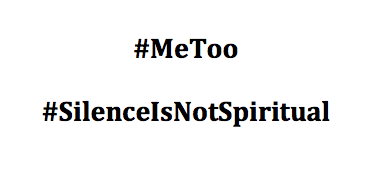“How the #MeToo Movement is Empowering Evangelical Women in America”
By: Olivia Peera, Communications Intern
In recent months, discussion of sexual harassment and assault has faced
significant change. With revelations of abuses of power, pay inequality, and allegations
of sexual misconduct, women in Hollywood have led a global movement to shift the
cultural dynamic between men and women, as well as, the powerful and powerless.
On October 15, actress Alyssa Milano tweeted: "Suggested by a friend: If all the
women who have been sexually harassed or assaulted wrote "Me too" as a status, we
might give people a sense of the magnitude of the problem." This tweet sparked the
renewal of the Me Too movement – first started by activist and founder of Just Be, Inc.
Tarana Burke in 2007 – created to encourage women to share their stories of abuse,
assault, or harassment and let others know they are not alone in their experiences.
According to the Associated Press, #MeToo garnered over 12 million posts and
reactions in the 24 hours after Milano’s tweet.
This whirlwind movement left many women wondering where and how they can
join and support others standing against gender inequality and sexual harassment,
abuse, and violence. In the evangelical Christian community, female leaders began their
own internal movement. From #MeToo, the evangelical community has gained
#SilenceIsNotSpiritual to raise awareness around abuses against women within
churches.
This new campaign, led by 140 women in the evangelical community, is meant to
address the lack of support from church leaders and organizations for women who report
instances of abuse. In 24 hours, 3,000 women co-signed the statement released on
behalf of the campaign, including prominent female evangelical authors, church
founders, and poets.
“We call our pastors, our elders, and our parishioners who have been silent to
speak up and stand up for all who experience abuse,” the #SilenceIsNotSpiritual
statement said. “There is no institution with greater capacity to create protected spaces
for healing and restoration for survivors, as well as confession, repentance and
rehabilitation for perpetrators.”
#SilenceIsNotSpiritual will be implementing its campaign through Easter,
meaning discussion of this issue will continue in the months to come. Recently, some
female leaders in the evangelical community have pointed out the lack of discourse
surrounding controversial or political topics. Many in the community are hopeful that this
campaign may allow for more debate and dialogue to be had amongst its members.
“Women of all faiths, races, cultures and backgrounds are bravely breaking their
silence,” the statement said, “yet many in communities of faith do not match their bravery
with action. Instead, feeling the problem is too pervasive, they have acquiesced, leaving
whole churches and communities paralyzed.”
Similarly to Hollywood, women are forging the path to change in the evangelical
community. This is an opportunity for female leaders in evangelical churches, and
religious institutions as a whole, to assert their presence and bring their opinions to the
fore. Religion has been dominated by the male point of view and the male perception of
what womanhood looks like. With this campaign, evangelical women are redefining their
role in their community.
If you are looking to support #SilenceIsNotSpiritual, read more about it here.

